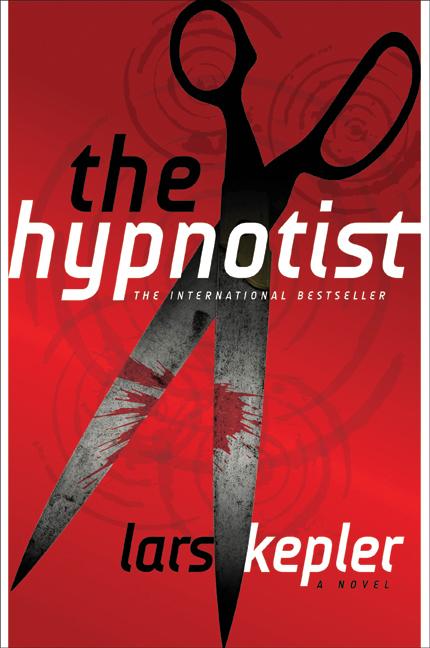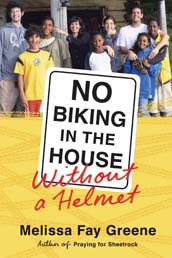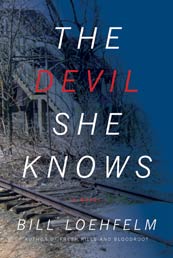Sarah Crichton Books
Here, with the support of the publisher, Shelf Awareness celebrates titles from the spring list of Sarah Crichton Books at Farrar, Straus & Giroux, particularly The Hypnotist by Lars Kepler.
Here, with the support of the publisher, Shelf Awareness celebrates titles from the spring list of Sarah Crichton Books at Farrar, Straus & Giroux, particularly The Hypnotist by Lars Kepler.
A Swedish thriller that's "phenomenal" and an "international sensation in France, Holland, Germany, Spain, Italy, Denmark." You've heard this before, but trust me. It's not PR hyperbole. The Hypnotist (Sarah Crichton Books/FSG, $27, 9780374173951, June 21, 2011), written by Lars Kepler and translated by Marlaine Delargy, is extraordinary--a heart-pounding, enthralling story of madness and malevolence.
 A 15-year-old boy lies unconscious in a Solna hospital, just north of Stockholm. He's suffered hundreds of knife wounds, the only survivor of a vicious attack in his home that killed his mother and younger sister. The bodies had been stabbed multiple times, kicked and beaten, and the little girl had been cut in half. The boy's father was found dead at a playground, and Evelyn, an older sister, is missing. Homicide detective Joona Linna thinks the killer is after her, too, and is sure the boy would be able to identify the killer, but how to get the information? At the advice of the doctor in charge, he calls another physician, Erik Maria Bark, who specializes in treating acute trauma. Bark rushes to the hospital, examines the boy, Josef, and says it's not possible to question him. When Linna casually suggests trying hypnosis, Bark forcefully declines, realizing he was called to the hospital to hypnotize the boy, a practice he had vowed a decade earlier to stop. He goes home, takes a few pills and falls asleep. But Linna is determined to find the sister, Evelyn, and equally determined to persuade Bark to hypnotize Josef; Bark finally capitulates, and when he starts, he realizes that he has longed to do this again.
A 15-year-old boy lies unconscious in a Solna hospital, just north of Stockholm. He's suffered hundreds of knife wounds, the only survivor of a vicious attack in his home that killed his mother and younger sister. The bodies had been stabbed multiple times, kicked and beaten, and the little girl had been cut in half. The boy's father was found dead at a playground, and Evelyn, an older sister, is missing. Homicide detective Joona Linna thinks the killer is after her, too, and is sure the boy would be able to identify the killer, but how to get the information? At the advice of the doctor in charge, he calls another physician, Erik Maria Bark, who specializes in treating acute trauma. Bark rushes to the hospital, examines the boy, Josef, and says it's not possible to question him. When Linna casually suggests trying hypnosis, Bark forcefully declines, realizing he was called to the hospital to hypnotize the boy, a practice he had vowed a decade earlier to stop. He goes home, takes a few pills and falls asleep. But Linna is determined to find the sister, Evelyn, and equally determined to persuade Bark to hypnotize Josef; Bark finally capitulates, and when he starts, he realizes that he has longed to do this again.
With the response he elicits from Josef, the puzzle deepens--is it possible that the boy killed his family and mutilated himself? Theoretically, yes, and to complicate matters, as Josef regains his strength, he accuses Bark of messing with his head, and threatens to "eliminate" him. Soon newspapers pick up the story with articles like "New Hypnosis Scandal for Tarnished Doc." Bark had promised never to hypnotize again after being accused of planting false memories in the mind of a woman in a therapy group of trauma survivors. There are further complications involving Bark's wife, Simone, who worries about his dependence on drugs and fears that he is unfaithful; Benjamin, Bark's teenage son, who has a blood disorder and has run afoul of some delinquent boys named after Pokémon characters; Evelyn, Josef's sister, who's found and is suicidal. And then Benjamin is abducted. Confusion arises from misdirection based on suspicion and contempt, and false leads based on good information. Bark and Linna attempt to untangle the clues as time is running out, while Bark delves into his past for answers that may lie in the therapy group. He wants to find his son; Linna is driven by an inner need.
Joona Linna's track record is unparalleled in Sweden; his success is partly due to the fact that he never gives up. What most of his colleagues don't know is that his stubbornness is the result of unbearable personal guilt. "Guilt that drives him, and renders him incapable of leaving a case unsolved. He never speaks about what passed. And he never forgets what happened." Something about driving in sunlight after a rain, everything "so wonderfully beautiful, and then gone forever."
Two men with pasts they cannot escape, single-minded in their attempt to stop an unspeakable horror as great as the horror at the beginning of the book--Lars Kepler hurls them through a riveting story of obsession and revenge. The Hypnotist is played out against the backdrop of a Swedish winter, where snow falls from a black sky, the trees are bare, and the chilling ice and slush are no match for the searing burn of evil. --Marilyn Dahl
Like many of us, the woman behind Sarah Crichton Books at
Farrar, Straus & Giroux sometimes experiences "buyer's remorse." As
Crichton tells it, her 2009 London Book Fair grab of Scandinavian thriller The Hypnotist put her through "the
seven stages of book buying. To the five stages of grief, add elation--and
remorse! 'Oh my God, %20JPEG.jpg) did I spend too much money?' " Not only did
Crichton have the pressure of a hot auction for this title--she was able to read
only part of the manuscript before ante-ing up. "The opening was all I had.
I had to wait and see how it turned out once it had been fully translated and
hope that I hadn't been wrong."
did I spend too much money?' " Not only did
Crichton have the pressure of a hot auction for this title--she was able to read
only part of the manuscript before ante-ing up. "The opening was all I had.
I had to wait and see how it turned out once it had been fully translated and
hope that I hadn't been wrong."
The book behind Crichton's roller-coaster ride is by Alexander Amdoral and Alexandra Amdoral, married writers who are eminent literary fiction authors in their native Sweden. The couple's first collaboration "had the elements of Scandinavian crime fiction that we all love," said Crichton. "It's smart and complicated, full of ideas and situations that we're not necessarily used to--and pairs those with real velocity." Crichton was looking for a manuscript "that combined the Nordic spooky quality with a more American style of fast-paced action. Sometimes Scandinavian crime fiction can be slow going; you know, 'dark doings in dark places' that reads like dark molasses. In this novel, there's darkness for sure--but it moves quickly!"
While she waited for the translation, Crichton had some comforting numbers to watch: The Hypnotist went straight to number one in Sweden, Denmark and Finland--then became huge in Italy and Germany (it has now been sold to 37 countries). "The fact that it broke out of Scandinavia and hopped to Italy told me something," Crichton said.
Once this highly anticipated book is on the reading public's radar screens (Lasse Hallstrom is already working on the movie), Sarah Crichton may become more of a household name--but she already knows a lot about readers. After a stint as editor of Seventeen magazine, Crichton spent many years at Newsweek (first as arts editor, then as a top editor), before landing in the book world in 1996 as the publisher of Little, Brown. She left in 2001 and worked independently for a while, most importantly on Mariane Pearl's A Mighty Heart. "I didn't want to go back into the industry until the time and position were right, which happened in 2004 when FSG created Sarah Crichton Books," Crichton said.
The former journalist's background informs her imprint: "Coming out of magazines, you are always conscious of audience. You engage in a dialogue with readers, and respect them regardless of age or stage. I think coming up in the traditional way in publishing, you can be too concerned with the book/author/agent/house. I'm always thinking, 'Who's going to read this? How is the reader going to react to this book?' Books transform readers, and readers transform books, too."
One of Crichton's first books at FSG was Ishmael Beah's topical and heartrending memoir A Long Way Gone, the first Starbucks book pick. "I believed right from the start that there was a potentially large audience for that book. Hundreds of people would show up when Ishmael gave a talk. My role was to get his story to a shorter length, to give it a colorful, eye-catching jacket so that that audience could find him. Word of mouth remains the best way to sell books."
 While The Hypnotist
will mesmerize genre lovers, Sarah Crichton Books offers other titles, too. May
will bring a new memoir by Melissa Fay Greene (Praying for Sheetrock) called No
Biking in the House Without a Helmet. According to Crichton, this book about
having a large family of both biological and adopted children "is so
funny, so warm--yet also has great writing and a great heart. She discusses
world issues through her family in a very honest way. I think the journalist in
me works hard to push writers to get at the truth, whatever the truth might be."
Crichton is also excited about June's The
Devil She Knows by Bill Loehfelm. "The main character is a really
tough young woman who's quite flawed and complicated. It's a gritty, terrific
crime novel, but I pushed Bill into making all of the relationships in the
books honest. Nobody falls into cliché."
While The Hypnotist
will mesmerize genre lovers, Sarah Crichton Books offers other titles, too. May
will bring a new memoir by Melissa Fay Greene (Praying for Sheetrock) called No
Biking in the House Without a Helmet. According to Crichton, this book about
having a large family of both biological and adopted children "is so
funny, so warm--yet also has great writing and a great heart. She discusses
world issues through her family in a very honest way. I think the journalist in
me works hard to push writers to get at the truth, whatever the truth might be."
Crichton is also excited about June's The
Devil She Knows by Bill Loehfelm. "The main character is a really
tough young woman who's quite flawed and complicated. It's a gritty, terrific
crime novel, but I pushed Bill into making all of the relationships in the
books honest. Nobody falls into cliché."
 Crichton notes that "named" imprints are on the
rise, and are having an effect on book buyers. "I'll hear from a
particular librarian a reviewer or a bookseller that they really love my books--when
your name is on the spine, you really have to think, does this reflect what you
believe in? When my name is associated with a book, there's a particular
sensibility. Last summer we released a nonfiction title that was called 'a
rollicking read about malaria.' " Regardless of genre, Crichton works
hard to make the reading experience exciting.
Crichton notes that "named" imprints are on the
rise, and are having an effect on book buyers. "I'll hear from a
particular librarian a reviewer or a bookseller that they really love my books--when
your name is on the spine, you really have to think, does this reflect what you
believe in? When my name is associated with a book, there's a particular
sensibility. Last summer we released a nonfiction title that was called 'a
rollicking read about malaria.' " Regardless of genre, Crichton works
hard to make the reading experience exciting.
"If I line up my books, it's a quite eclectic list, but there's a coherence that I'm proud of," Crichton said. "I think it's probably three things: I care very much about that difficult-to-define thing called 'good writing.' I like books that grapple with serious issues in a serious way that never becomes heavyhanded. Finally, I like books with a bit of unpredictability." While a portion of her list tends toward thrillers and crime books, the ones she signs "have to have that same terrific quality of writing that you find in all FSG titles."
All of Crichton's "three things" combine in what she says next: "When I finish reading a book, I want to have learned something that I didn't learn before, to have thought something I hadn't thought before." No wonder she hopes that Sarah Crichton Books stands for "smart books for smart readers"; this particular editor is clearly one of her own: "I signed up a novel the other day and I wanted to make everybody shut up so I could get back to reading!"--Bethanne Patrick
 On your nightstand now:
On your nightstand now:
Alexander: My big brother's latest book about practical hypnosis and a tome of forensic science for crime scene investigators and prosecutors--it's very exciting and perfect as a bedtime story in the eyes of Lars Kepler. (I myself would rather read Cormac McCarthy's All the Pretty Horses.)
Alexandra: A fluorescent, plastic rabbit. When our five-year old daughter comes running in the middle of the night, she uses the rabbit-lamp as some kind of flashlight. Beside the rabbit on the table there are three glasses of water and Blood Meridian by Cormac McCarthy, an author we both really like. I used to have a notebook and a pen beside my bed, in case I suddenly got a tremendous idea in the middle of the night. But nowadays (since we write together) I just wake Alexander up and tell him. His receptiveness to this varies with the quality of the idea.
Favorite book when you were a child:
Alexander: It was a book about a boy called Oscar who only ate houses. He loved bricks, nails, and reinforcing bars--I really identified with that boy (but I don't really remember in what way).
Alexandra: When I was a child I read The Three Investigators. It was almost an obsession. I used to play Three Investigators with my friends. I was Jupiter Jones, the chubby thinker, and my best friend Helena used to be Peter Crenshaw (we couldn't pronounce his last name, we only called him Pete) and Bob Andrews... well, he was played by whomever was around.
Your top five authors:
Alexander: Dostoevsky, Euripedes, Shakespeare, Ovid and Astrid Lindgren.
Alexandra: Rainer Maria Rilke, Emily Dickinson, Anton Chekhov, Charlotte Brontë and Friedrich Dürrenmatt.
Books you've faked reading:
Alexander: Almost all of them, I was about to say, but that's not true. Still... I have faked reading some, if we exclude school--I remember I faked reading Moby Dick once and got away with it.
Alexandra: I'll dare to say it since Book Brahmin isn't a Swedish page: I've faked reading some of our colleagues' and friends' books. It's terrible, forbidden.
Book you're an evangelist for:
Alexander: I've found myself an evangelist for The Exorcist--it must have been 20 years since I read it, but I've been thinking about it lately as a fantastic crime novel, brilliant and very surprising.
Alexandra: Right now it is Joyce Carol Oates's My Sister, My Love. It's a thriller-like drama, very well accomplished. Otherwise, I do have a need for poetry. It's good for me.
Book you've bought for the cover:
Alexander: I remember that I bought a book by Hermann Hesse despite the cover... and actually, I bought J.M. Coetzee's novel Disgrace for the cover. It contained a feeling I just had to explore. It was just a picture of a bony dog on a sandy road close to a rusty diesel tank or something.
Alexandra: That must be one of the Nancy Drew books from when I was a child. I remember that I was very disappointed. Since I loved Jupiter Jones and the exciting plots of The Three Investigators series, I found Nancy Drew too girlish and strangely vague.
Book that changed your life:
Alexander: Hemingway's The Old Man and the Sea. I was 18, loved it, but thought to myself: How hard can it be to write a thin novel like that? So I sat down and wrote... it was maybe a bit harder than I'd imagined, but two years later my first novel was published. Well... I was not awarded the Nobel Prize for that one, but it was a start and that changed my life.
Alexandra: For Those I Loved by Martin Gray. I was about 13 when I read it, and the shock I got finding out the crimes of the Second World War gave me a scare that I have not gotten over yet. I think that crime fiction investigates the horrible sides of mankind in order to retell them as stories about justice and meaning in a world that is full of confusion and lack of mercy.
Favorite line from a book:
Alexander: It's a line from an Erskine Caldwell novel called God's Little Acre. I'm not sure I remember it right, but it's about a very pretty woman. The way I read it, it's not dirty at all, it's just full of passion: "She just makes a man want to get down on his knees and lick something."
Alexandra: Maybe I'm totally wrong now, but I think that Raymond Chandler wrote: "Bay City. It sounded like a song. A song in a dirty bathtub." As a young girl I read Dashiell Hammett and Raymond Chandler a lot, and I really liked that kind of hardboiled and humorous metaphor.
Book you most want to read again for the first time:
Alexander: One of the strangest and most fascinating novels I've ever read is The Witness by the late Argentinean author Juan José Saer. A group of colonial explorers are attacked and killed by a tribe in South America. Only the main character's life is spared. The tribe brings him home to keep him in their village as a kind of witness to an upcoming cannibalistic orgy.
Alexandra: Tarendol by René Barjavel. It's a love story that ends tragically. Just like when I first saw Romeo and Juliet, it was a story that broke my heart, and I was about 13 and cried and cried for weeks after I had read it. I hated the author who had not saved my heroes. Fiction is a strange and strong drug.
Why is there so much great crime writing going on in Scandinavia?
Alexander: One thought I had: The source for all thrillers is the old fear of darkness, but as a writer, during the writing process, you can actually stop the perpetrators and guarantee happy endings. That's a way to control or disarm the fear for a moment (in the same way a rollercoaster transforms the fear of heights into something fun). People have always been afraid of the dark--not only children, we're all afraid, we only pretend it's getting better when we grow up. And the fact is that it's not easy to find a darker place than Scandinavia during the winter. The sun doesn't even rise for three months in the northern parts. So with all this darkness, it's not that strange we have this strong tradition of crime writing.
Alexandra: I also think an important factor is our self-image. We have grown up in the feeling that our part of the world is the best, the ultimate, perfect--the norm. But the truth is that Sweden is a country with many faces, some of them really grim. This feeling--that our society isn't what it wants us to think it is--creates double feelings. A strange, creeping feeling: something in going on, beneath the surface, something very, very bad.
What was your entrance to the genre?
Alexander: It's actually our love for thrilling movies. We've been married for 19 years, and every evening we watch at least one movie. That's a whole lot of movies if you start counting. When we decided to write a crime novel together, we made a kind of challenge to ourselves--is it possible for us to transfer a filmic atmosphere into words, the high tempo and strong engagement? Because a crime novel must be as thrilling as a movie and as deep as a book. We wanted the readers to feel totally absorbed while reading Lars Kepler: that was our mission, anyway, when we decided to take part of the Scandinavian tradition of crime writing.
How do you write together?
Alexander: Some writers who work together divide the chapters between them, some divide the characters, but we don't do that. We write everything together like one person. We are actually Lars Kepler when we write, and he's just one. We discuss the plot all the time, when we pick up our children at school, when we shop for dinner. We even wake each other up in the middle of the night to discuss turning points. And when we actually write we always sit beside each other and change texts maybe 20 times a day. If we were to flick through The Hypnotist, we couldn't find one single sentence that only one of us wrote. They're all written by Lars.
Alexandra: First, when nobody knew who Lars Kepler was, a female journalist e-mailed us (we had a lars.kepler@hotmail.com address) and said that she had found out that Lars was a woman. The word "bloomers" occurs once in The Hypnotist and she was convinced that no man would know of such a garment. But it was actually Alexander who wrote that word.